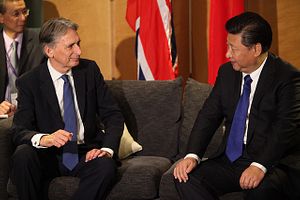The Rebalance author Mercy Kuo regularly engages subject-matter experts, policy practitioners and strategic thinkers across the globe for their diverse insights into the U.S. rebalance to Asia. This conversation with Jackson Ng – Partner at a boutique law firm based in the City of London, Barrister practicing from Temple in London, Political Advisor in the U.K. Parliament, and Director of Conservative Friends of the Chinese – is the 49th in “The Rebalance Insight Series.”
What is the potential impact of the Brexit referendum on U.S.-U.K.-China relations?
The Chinese government and many businesses have been rather vocal (diplomatically) about why they want the U.K. to remain inside the European Union. Other than clear economic reasons, China has traditionally looked at the U.K., especially increasingly so at having the U.K. as a counterbalance to relationships with other countries, such as the United States. One only needs to look at the how the Asian Infrastructure Investment Bank (AIIB) was established; where the U.S. was not supportive and apparently displeased about the U.K.’s support for it.
In the short to medium term, whilst the U.K. repositions itself away from the EU and refocuses internally – such as the negotiations with the EU and dealing with Scotland wanting a second referendum on independence – our influence in the world will be affected. Without the U.K. being a “buffer” in U.S.–U.K.–China relations and also within the EU, I suspect that China has temporarily lost an influential friend on the international stage.
What are the consequences of Great Britain’s decision to leave in the European Union on Britain’s role as an international financial center and clearinghouse for Chinese yuan-denominated transactions?
It is still early days as Article 50 has not yet been invoked and negotiations have not begun with the EU, but it depends fundamentally on whether London’s euro-dominated businesses will be moving to somewhere like Frankfurt or Paris, or even New York.
It will also be influenced by how China views Brexit. The referendum results will naturally push China to take a long and hard look at whether current and future investments in the U.K. can be viewed positively due to the short- to medium-term impact on the British economy and whether Chinese companies will be able to continue to utilize Britain as a springboard into further investments to the rest of the EU.
The Brexit debate has generated deep soul-searching on Great Britain’s strategic identity in Europe and the global arena. From your perspective what do the referendum results say about British public perceptions of Great Britain’s geopolitical identity?
There are quite a lot of people in Britain who think that Britain has been concentrating too much on its European neighbors and in Europe, politically and economically, as opposed to exercising its international and historical links, networks and influence with other parts of the world, such as with the Commonwealth members and countries such as India and China.
Brexit has confirmed further that the British are fiercely patriotic and proud of their national identity. That the British feel that their government, parliament and nation’s sovereignty have been eroded by the EU, especially by the EU’s free movement of people principle that has led to an “open door policy” with “uncontrolled” immigration from the EU’s eastern members.
Looking ahead, what must British entrepreneurs and businesses do to remain competitive in existing and emerging markets?
I have the utmost faith that the resilience of the British people will once again shine through and rise to the occasion. Britain has always been a great trading nation that trades not only with its neighbors but also with the wider world.
Our economy is still fundamentally strong and the unique selling point that will get us through the tough times ahead will be our people, who are among the most creative and talented in the many industries that we lead. As long as we continue to design and make the best products in the world, offer the best professional services and provide the highest educational standards and schooling and excel in the entertainment industry, we still have a lot to offer to the rest of the world, especially in the future, where we can then trade not only with the EU but much more openly and freely with the rest of the world.
How should the next U.S. president articulate the importance of U.S.-U.K. relations vis-à-vis China’s growing global influence?
Britain and the U.S. have strong and deep links – a special relationship which will endure Brexit. Our relationship with the U.S. on trade, investment and culture will continue to grow, along with our close defense ties and ever growing cultural links.
Britain is embarking on a new chapter in its history and the U.S. should openly and strongly support Britain and its people in Britain’s negotiations with the EU vis-à-vis Article 50 being invoked. I know the British people will welcome that support.

































